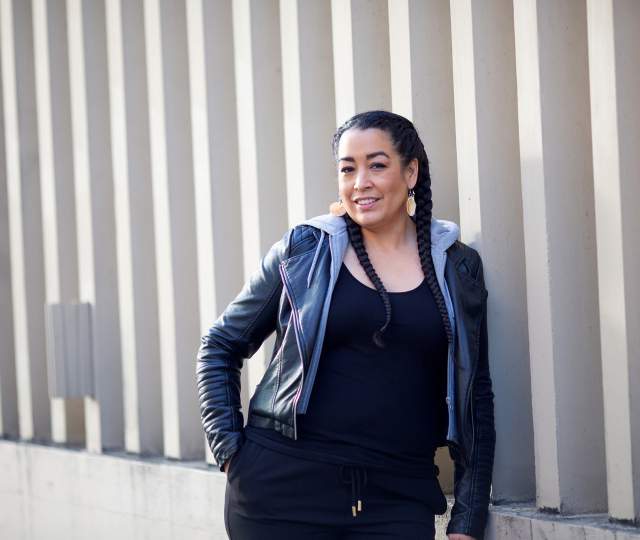Indigenous strategic health plans
Learn more about the Indigenous health & wellness strategy and Indigenous mental wellness plan.
Working with Indigenous partners and communities, and building on existing knowledge and experience, we are committed to strengthening health services and improving health outcomes for all First Nations, Métis and Inuit peoples.

Learn more about the Indigenous health & wellness strategy and Indigenous mental wellness plan.
Indigenous Health and Wellness Strategy (IHWS) 2022-2026
The IHWS serves as a framework for IH’s 23,000 staff and 1,900 physicians to provide high quality, safe and effective health services to all Indigenous peoples and families. The strategy is informed by and supports commitments to Indigenous partners through signed agreements, including the Letters of Understanding (LOUs), Partnership Accord, and Cultural Safety Declaration, as well as the IH Strategic Priorities and Ministry of Health (MOH) mandate.
Directly aligned with our focus on providing quality driven, people-centred care for Indigenous peoples, the Indigenous Mental Wellness Plan (AMWP) aligns with our mental health and substance use, First Nations Health Authority and Indigenous community planning. It was developed through input by Indigenous peoples, families, communities, organizations and health-care providers.
Learn more about Indigenous Health & Wellness engagement initiatives within the Interior.
The inaugural Indigenous Engagement Forum was successful in creating space for external Indigenous partners and IH leaders and staff to come together, build and strengthen partnerships, share information on joint projects, learn about IH services and programs, and gather input on services. The Forum also highlighted successful partnerships and outstanding initiatives.
In June 2020, Dr. Mary Ellen Turpel-Lafond was appointed by the B.C. Minister of Health to review Indigenous-specific racism in the provincial health care system. The investigation found extensive examples of racism and discrimination against Indigenous patients and resulted in the In Plain Sight (IPS) Report – the full report and a data report – published in November 2020 and February 2021 respectively. IPS made 24 recommendations to be implemented within and integrated into the B.C. health-care system in response to Indigenous racism.
The following reports show Interior Health’s progress on those recommendations on changing systems, behaviours and beliefs. As part of IH’s commitment to action, we will publicly report progress towards implementing the IPS recommendations annually.
We are committed to working together with First Nation and Métis partners to change our health system and eliminate racism and discrimination at Interior Health.
Our commitment to Indigenous health and wellness is strengthened through partnerships.
Indigenous Patient Navigators (IPNs) are important members of our care teams. They work in hospitals and health centres throughout Interior Health and are available to support Indigenous peoples and their families during their care. Having an Indigenous Patient Navigator as part of the patient care team creates a safe space for Indigenous peoples to interact with the health system.
Whether or not you wish to self-identify as Indigenous, Indigenous Patient Navigators are here for you. The goal of an Indigenous Patient Navigator is to help make your hospital care and journey to wellness safe, comfortable and less confusing.
The Indigenous Discharge Toolkit was developed to assist clinicians with discharge planning for Indigenous patients from Royal Inland Hospital to their home communities within the Thompson Cariboo Region of Interior Health.
The toolkit's resource document helps the care team connect with appropriate community members and resources based on the patient's needs and wishes. The toolkit is also informative for many clinicians within the Thompson-Cariboo region.
Much gratitude to all of the Indigenous partners, First Nations Health Authority Community Health Practice Consultants, Nation Health Managers, First Nations Health Directors, Métis Health System Advocates, Nation Community Engagement Coordinators, Indigenous Patient Navigators, and the many more who contributed to the toolkit development.
If you have any queries about the department, program or project identity, or if there is any missing/updated information you would like to provide, please do not hesitate to contact us at RIH.EDU@interiorhealth.ca.
Interior Voices is our Indigenous health and wellness podcast series that explores the intersection of health and culture in the workplace, our everyday lives and patient care.


IH offers a range of services to help those who may have mental health, substance use or housing needs.
/stories/sharing-warmth-and-hope-ih-health-services-help-communities


Jayme helps ensure lived experiences are not just welcomed but embedded across Mental Health and Substance Use services at IH.
/stories/we-are-ih-coordinator-centers-peer-voices-care


As temperatures drop, it’s important to be aware of the health risks of cold. Here's what you can do to ensure you remain safe and healthy.
/stories/how-protect-yourself-and-others-when-temperature-drops


Heart disease is the number one killer of women worldwide and the leading cause of premature death in Canada. One in 3 women will be affected by heart disease.
/stories/how-women-experience-heart-disease-differently-men


Wavemakers is a free, groundbreaking virtual reality career-building program where post-secondary students can build skills and connect with employers like IH.
/stories/ih-helps-students-explore-careers-through-virtual-reality-program


Interior Health (IH) and our community partners offer mental health services for youth and adults. Our services are confidential and safe, and free of judgment
/stories/mental-health-services-youth-and-adults-interior
Receive news, alerts, public service announcements and articles right to your inbox.
